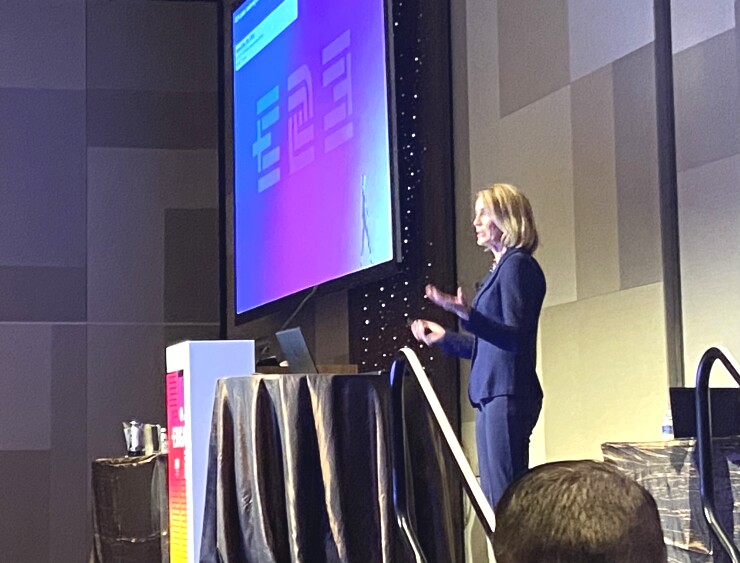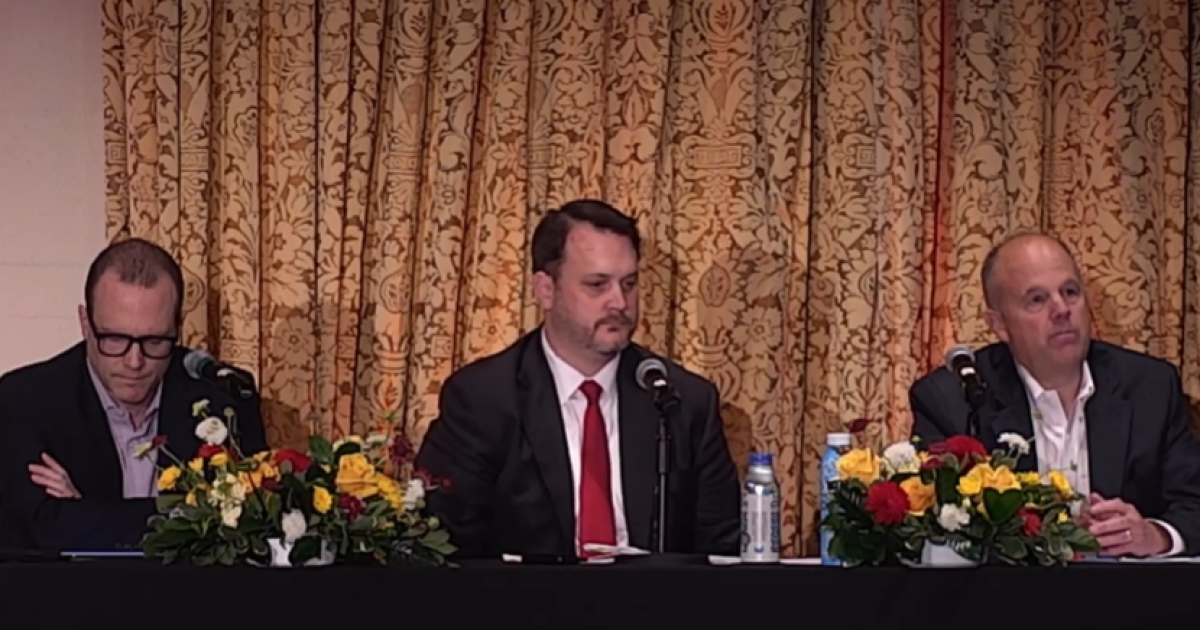Accounting
Why accounting firms are bleeding talent
Published
7 months agoon

Enjoy complimentary access to top ideas and insights — selected by our editors.
The talent shortage facing the accounting profession is well known at this point, as graduates with accounting majors are deterred by stagnant wages and a lack of education on career paths — while existing accountants leave the field entirely. Amid this identity crisis, firms are starting to look inwards for solutions.
Data from the most recent
But many in the field say the hurdles to becoming a licensed CPA, including the test itself, are simply not worth the payoff.
Read more:
“Tuition costing six figures, 150 credit hours just to sit for the exam and a median salary of $79,880 just isn’t going to get most younger people out of bed in the morning when they can work from their couch making money doing things they’re interested in and have a flexible schedule,” said Erin Andrews, owner of the Vero Beach, Florida-based firm Level Accounting & Advisory.
Andrews highlighted the proliferation of social media personalities and private-equity firms encroaching on the accounting space as “supposed” experts, driving the consumer demand for increased availability and devaluing licenses.
“Being available and offering a great client experience seem to be more important than having letters after your name today,” she said.
Some organizations seeking to address this disparity are developing their own training regimens and partnering with outside trade groups to expand recruitment efforts.
In addition to partnering with the National Association of Black Accountants and Future Business Leaders of America,
The New York-based
Zachary Gordon, a CPA and chairperson of the New York State Society of CPAs’ digital assets committee, said technology isn’t just essential for addressing the immediate effects of the shortage, but is also shaping the evolution of the profession.
“AI will help to complete mindless, repetitive tasks and allow talent to shine with higher-value aspects of an engagement. … Accounting becomes less about commodities like a tax return or financial statements and more about being a trusted advisor providing tangible value to clients,” Gordon said.
Tod McDonald, a CPA and co-founder of Valid8 Financial, agreed with the sentiment, highlighting how today’s artificial intelligence-powered tools allow what was once lengthy data preparation to be completed in hours as opposed to weeks.
Read more:
Outside of wages and upward mobility, the profession’s long hours and general lack of flexibility are driving away younger professionals.
Major firms like Ernst & Young recognize these shifts, and are developing plans to address some of the core issues. The organization’s U.S. firm plans to
“There was a time where working ridiculous hours during busy season and not seeing your family was a badge of honor,” said Dean Sonderegger, general manager of research and learning at Wolters Kluwer Tax and Accounting. “Many younger employees no longer feel this way and are looking for more balance between their work and personal lives … and are attracted to firms that are more flexible.”
Read on to find out more about the depth of the talent shortage and how seasoned advocates for the profession are working to bring future generations of talent into the fold.
AICPA collaborates to help tackle talent shortage

Amid the growing talent shortage facing the profession, the American Institute of CPAs worked with the National Association of State Auditors, Comptrollers and Treasurers to publish a
One of the main disparities highlighted in the report is the differences in accounting and auditing standards between those working in the government and private-sector markets. CPAs working in the public sector often come with specialized expertise in certain areas, but salaries and audit fees aren’t always commensurate with that knowledge.
“We have a talent shortage in accounting that affects business as a whole, and many of the pipeline initiatives the profession is putting in place will help the public sector as well,” Susan Coffey, the AICPA’s CEO of public accounting, said in a statement this month.
Read more:
The top MPs building out the talent pipeline

When it comes to top leaders working to stem the outflow of professionals from the world of accounting, the eight honorees on Accounting Today’s
Public perception, tighter partnerships with colleges and universities, broader education regarding career paths in accounting and more are all areas in which the MP Elite are working to make changes both within their firms and across the profession. These recommendations are designed for deployment right away, or as part of long-term strategies.
“The accounting profession faces a significant challenge in how it’s perceived, particularly by younger generations,” Christopher Geier, chief executive of Sikich, told AT. “To combat this, we need to launch a multitiered education and awareness campaign.”
Read more:
Staffing spotlight shifts from seniority to skill sets

Recruiters are starting to focus less on how long a candidate has been in accounting and more on
At the heart of the trend are a host of factors — a lack of education on career opportunities being one of the most significant.
“Accounting is not a linear profession, and aspiring accountants are often not informed about the various paths they can pursue. … As a result, early-career professionals may struggle to envision the long-term utility of myriad opportunities associated with pursuing accounting and tax as a profession,” said Paul Bryant and Stan Hannah, partners at Plante Moran.
Read more:
The talent shortage creates a proving ground for firms

Fewer and fewer college students are choosing to major in accounting, making those who do a valuable asset to firms of any size. But what can companies do to distinguish themselves from their competitors?
“These successful firms will achieve this by creating a culture that fosters mutual support, offers meaningful career opportunities, promotes team cohesion and ensures both personal and professional fulfillment,” Eric Abati, CEO of San Antonio-based Regional Leader ATKG Advisors, said in an interview with AT’s
Abati represents one perspective of leaders — those focused on changing the tried-and-true corporate culture that is standard throughout the accounting profession — while others focus on career mapping and wage disparities.
Read more:
What will it take to fix the pipeline issue?

Andrey Popov/Andrey Popov – stock.adobe.com
Competitive wages, ample preparation for certification exams and a rebranding campaign. These are just a few of the recommendations that experts with the National Pipeline Advisory Group shared for how employers can do their part in addressing the staffing shortage.
“With so many of the themes we uncovered, the solutions lie at the employers’ feet,” Jennifer Wilson, who served as facilitator for the group’s work, told attendees at the AICPA Engage Conference in June. “We’re going to have to make changes. We need to take responsibility as employers for these solutions.”
Salaries were the first up, as data from the group’s report found that only one in nine business majors selected accounting as their major, as the others were able to obtain a higher salary in a more competitive industry.
Read more:
You may like
Accounting
Technology as the cornerstone: Success strategies for small and medium-sized accounting firms
Published
1 hour agoon
June 12, 2025

The accounting profession is more complex than ever before. Small and medium-sized accounting firms face increasing competition, shifting client expectations and rapid technological innovation. While many firms seek to adapt through trial and error, our recent study provides evidence-based insights into what truly drives perceptions of success in this challenging landscape.
Through a survey of 192 firms collected by the Center for Accounting Transformation, we found that the most significant factor consistently associated with success is technological leadership. Firms that consistently stay ahead of their peers with advanced technologies outperform their peers. Beyond technology, other contributors to success include exceeding client expectations and fostering a culture of continuous learning and improvement.
For practitioners, these findings offer actionable guidance. Success in today’s accounting world is not about doing everything, but about prioritizing the right strategies. Below, we outline the suggestions that can help small and medium-sized firms thrive based on our empirical results.
Key factors driving firm success
Leadership in technology adoption: The clear standout factor in our research is technological leadership. Firms that position themselves ahead of their peers in adopting advanced tools—such as AI, automation and cloud platforms—are consistently perceived as more successful.
- Why it matters: Technology enhances efficiency, allowing firms to automate parts of routine tasks like tax preparation and reviewing workpapers. It also enables firms to remain resilient during periods of rapid change, adapt to shifting client needs, and compete effectively with larger firms. By leveraging technology, firms can streamline operations, reduce costs, and free up resources to focus on higher-value services.
- Survey insight: Respondents noted that tools like AI not only streamline operations but also solve staffing challenges. For instance, respondents to our study noted, “AI allows me to produce more today by myself than when I had a staff of 20.” Additionally, remote work technologies were highlighted as game-changers: “The ability to work anywhere with our paperless environment is a tremendous advantage.”
Exceeding client expectations: Technology is not the only factor that incrementally enhances perceptions of success; firms must also focus on delivering exceptional client experiences. Firms that go beyond meeting expectations to actively contribute to client success see stronger client loyalty and reputational benefits.
- Why it matters: Clients increasingly demand tailored, strategic solutions, not just compliance work. Exceeding expectations strengthens trust and fosters long-term relationships.
- How to implement: Use client feedback to identify service gaps and opportunities for improvement. Train staff to adopt a client service approach, focusing on clients’ broader business goals.
A culture of continuous learning and improvement: Organizational culture is another important driver of success. Firms that emphasize learning, innovation, and improvement outperform those focused solely on team dynamics or routine processes.
- Why it matters: A forward-thinking culture helps firms adapt to industry changes, attract top talent, and retain staff in a competitive labor market.
- How to implement: Implement professional development programs that prioritize tech skills and leadership training. Regularly evaluate firm processes and encourage team input for improvements.
Surprising findings, what didn’t matter as much: Our empirical research also debunks some common assumptions. For example:
- Service specialization: While many practitioners emphasize the need for industry or service specialization, our findings show these factors have limited incremental impact on success.
- Advisory work vs. compliance work: Contrary to popular belief, the balance between advisory and compliance work does not significantly drive success. Instead, success stems from how services are delivered, not the type of services offered.
Practical steps for practitioners
To capitalize on these findings, firms should focus on:
- Investing strategically in technology
- Assess your firm’s current tech stack and tech abilities and compare it to industry leaders.
- Prioritize investing in the technology skills of your people and in investments in AI, automation and cloud-based solutions that directly enhance client service and operational efficiency.
- Reframing client relationships
- Position your firm as a strategic partner, not just a service provider.
- Create metrics to measure and track client satisfaction and loyalty.
- Fostering a culture of innovation
- Encourage staff to explore new technologies and processes.
- Recognize and reward innovative ideas that enhance client or firm outcomes.
Looking to the future
The accounting profession is evolving at a breakneck pace, with new technologies like generative AI, predictive analytics and remote work technology reshaping the landscape. For small and medium-sized firms, success depends on being proactive: adopting transformative technologies, exceeding client expectations, and fostering a forward-thinking culture. By prioritizing these strategies, your firm can navigate the challenges ahead and emerge as a leader in the industry.
For more detailed insights or guidance on implementing these strategies, feel free to reach out to the authors.

The accounting profession is facing a perfect storm of staffing challenges. There aren’t enough accountants to handle the rising workloads, the workforce is getting older, and the number of new CPAs coming in has been slowing to a trickle over the past ten years. Companies are desperate for ways to keep their quality of service high, even though they have smaller teams. Artificial intelligence (AI) is one possible answer.
Accounting’s Talent Shortage By the Numbers
About
Also,
In addition to retirements, a lot of accountants in the middle of their careers have left the profession in the last few years.
Ironically, there continues to be strong demand for accounting services. Companies need to find ways to do more with less because there is more work and fewer people. This is where technology, particularly AI, comes into play.
What Accounting Firms Can Automate Today
Recent advances in AI offer a timely opportunity to boost efficiency and alleviate overburdened staff. Modern AI tools can handle many routine, time-consuming accounting tasks, allowing human professionals to focus on higher-value work.
Here are some examples of how automation powered by AI can be used across different accounting tasks:
Bookkeeping and data entry: AI-powered software can classify revenue and expenses and reconcile accounts, automating bookkeeping and data entry. Algorithms scanning invoices or receipts can automatically extract all relevant fields, saving time and reducing data entry errors. AI matching ledger transactions to bank statement lines accelerates bank reconciliations from hours to minutes by detecting exceptions for human inspection.
Document review and audits: AI systems can quickly read and extract data from documents for audits and document review. AI lets audit teams evaluate entire contracts, agreements, and financial records for issues.
Tax preparation and research: AI is simplifying tax preparation and research, from data collection to filing. Tax prep and research machine learning models can automatically extract and prepare W-2s, 1099s, and other tax documents for returns. This makes hand-entering taxes much easier. AI can optimize a client’s tax situation by finding qualified credits or deductions by verifying transactions against tax legislation.
Analytics and forecasting: AI can find trends and generate concepts that humans cannot. Accounting and advising firms use AI-driven analytics for risk assessment, fraud detection, and predictive forecasting. An AI model can analyze client financial data and identify unusual transactions or trends, alerting accountants to potential issues.
What AI Does Not Replace: The Human Judgment Factor
Despite AI’s amazing potential, there are crucial areas of accounting that technology should not (and cannot) replace. Accounting is, at its core, a profession of judgment, ethics, and trust – all elements that require a human touch.
Professional judgment and expertise: AI doesn’t have the background, skepticism, or experience that accountants do. Experienced accountants can comprehend unclear legislation, apply accounting standards to new scenarios, and make difficult transaction decisions. AI can propose or offer facts, but ultimate judgments like audit opinions or tax positions require human skill and accountability.
Ethics and skepticism: Accountants must follow strong ethical guidelines and take care. AI lacks ethics and skepticism. Fraud detection requires questioning and verifying facts with a healthy doubt, not merely noticing irregularities. A human auditor must determine if an unusual pattern is fraudulent or not. Human monitoring is needed to check AI outputs since algorithms can make mistakes or “hallucinate”.
Client relationships and communication: Accounting often involves talking to and working directly with clients. In uncertain times, clients rely on their trusted advisors to look at the numbers, explain options, and put their minds at ease. AI cannot replace the trust and understanding CPAs build with clients. When a business has to make a tough financial decision, they want a human advisor who can listen to its concerns and tailor advice to the specific situation.
Strategic thinking and creativity: AI can evaluate data effectively but not innovate or think strategically. Accounting firms must develop strategies, solve difficult financial problems, and solve client problems creatively. AI might show that a client’s costs are going up, but accountants need to be creative and think outside the box to find the best pathway forward. AI works with people to quickly analyze data and give them information that helps them make those decisions. Then, people use their judgment and creativity to choose the best course of action.
So how does my firm get started?
In general, AI should handle tasks, not responsibilities. By automating routine tasks, AI lets accountants use their most valuable human skills, such as judgment, ethical reasoning, communication, and strategic insight.
The bottom line is that AI can be a powerful ally in solving the accounting labor shortage, but success requires choosing the right tools and using them wisely. Start by addressing your firm’s pain points with proven AI solutions – whether that’s automating a tedious workflow or augmenting your team’s analysis – and ensure you maintain robust human oversight. With a thoughtful strategy, accounting firm leaders can harness AI to not only fill the labor gap but also to transform their firms for the better: boosting efficiency, enhancing services, and making the profession more attractive for the next generation of talent.


The Securities and Exchange Commission is already making plans in the event that the massive tax bill now moving through Congress ends up shifting the Public Company Accounting Oversight Board’s duties to the SEC.
In late May, the House
“I guess as an initial matter, certainly, we are aware of the proposed legislation that is both in the House and the Senate as part of the budget reconciliation bill,” said SEC acting chief accountant Ryan Wolfe during Financial Executives International’s SEC and Financial Reporting Conference at the University of Southern California’s Leventhal School of Accounting. “I think from the staff perspective, where we’re assisting the Commission, it’s important that we are thinking about these issues, are monitoring and are prepared as the potential for these bills to move forward would result in the Commission having new statutory responsibilities. Specifically with respect to standard-setting and inspections, the enforcement authorities would also transfer, but we already have shared jurisdiction with respect to those activities.”
He noted that the SEC has been hearing a great deal of feedback about it across the spectrum.
“I would observe that one thing that I hear, I don’t want to say universally, but quite consistently, is the importance or the overall ecosystem of the three major programs that the PCAOB engages in, being standard-setting for auditors, inspections of auditors to evaluate the compliance with those standards, and similarly, the enforcement function,” said Wolfe. “And so I think that these are incredibly important objectives that will continue regardless, which is just to say, without providing any significant details, that we’re aware of it and we are working on those issues.”
On the other hand, the SEC’s Office of Chief Accountant is prepared in case the provision gets dropped from the final bill.
“But in the event that that would not go forward, the OCA’s assistance with the Commission and the oversight of the PCAOB will continue regardless,” said Wolfe.
He also pointed to the importance of continuing standards such as the
Panel moderator Mark Kronforst, a partner at Ernst & Young, pointed out that SEC chair Paul Atkins said during a recent congressional hearing that despite a recent 15% reduction in staff at the SEC, there would still be room in the budget for the PCAOB under the legislation.
Another SEC official also acknowledged the recent reduction in the staff during a later panel discussion.
“Certainly, there has been a reduction in the federal workforce and the Commission, the SEC, has been no exception to that,” said Gaurav Hiranandani, acting deputy chief accountants at the SEC. “Many of the talented staff at the Commission have decided to retire or have sought opportunities outside of the commission. Within OCA, we have also seen some talent depart, some longstanding staff.” He noted that some of the speakers at last year’s conference are among those who left.
Financial Accounting Standards Board chair Richard Jones also spoke at the conference and discussed the progress that FASB has been making on its standard-setting.
“A couple years ago, we comprehensively reset our agenda,” he said. “We did robust stakeholder output to really ask an open-ended question of what should be the FASB’s priority, and what you’ve seen over the last couple of years is us executing on that revised agenda. If you pull up our technical agenda today, you’ll see there are 12 projects on our technical agenda. Of those 12 projects, five of those have been voted out by our board to proceed to final standards. Five of those are in redeliberations, meaning that we’ve already issued an exposure draft, we’ve gotten great input from our stakeholders, and our board will be redeliberating to decide what direction to go forward on those standards. We voted to move forward with an exposure draft on another standard, so that’s 11 of the 12. If you follow those through, and you follow a plan of execution on those standards, it’s very reasonable that we could complete substantially all the projects on our agenda at or about the end of this year.”

The true meaning of Trump Derangement Syndrome

Tenants are flooding the suburbs where they can’t afford to buy

How a Christian group is changing education in America

New 2023 K-1 instructions stir the CAMT pot for partnerships and corporations

The Essential Practice of Bank and Credit Card Statement Reconciliation

Are American progressives making themselves sad?
Trending
-

 Personal Finance1 week ago
Personal Finance1 week agoWhat the national debt, deficit mean for your money
-

 Economics6 days ago
Economics6 days agoJobs report May 2025:
-

 Economics1 week ago
Economics1 week agoElon Musk’s failure in government
-

 Economics6 days ago
Economics6 days agoDonald Trump has many ways to hurt Elon Musk
-

 Finance6 days ago
Finance6 days agoStocks making the biggest moves midday: WOOF, TSLA, CRCL, LULU
-

 Economics6 days ago
Economics6 days agoDonald Trump has many ways to hurt Elon Musk
-

 Economics4 days ago
Economics4 days agoSending the National Guard to LA is not about stopping rioting
-

 Blog Post5 days ago
Blog Post5 days agoMastering Bookkeeping Tasks During Peak Business Seasons
